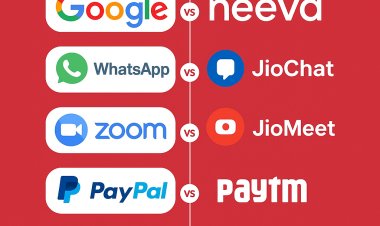Top 10 Job-Ready Skills for 2026 – Future Career Skills You Must Learn
Discover the top 10 most in-demand skills that will make you job-ready in 2026. Learn what employers want, how to upskill effectively, and secure your dream career in the future job market.

The world of work is changing faster than ever. By 2026, automation, artificial intelligence, and digital transformation will reshape almost every industry. The question isn’t just about having a degree anymore — it’s about having the right skills that make you employable and future-ready.
Whether you’re a student, a recent graduate, or a working professional looking to stay relevant, learning these job-ready skills for 2026 will help you thrive in a competitive market.
Let’s dive into the top 10 skills that will make you job-ready in 2026, why they matter, and how you can develop them.
Table: Overview of Top 10 Job-Ready Skills for 2026
| Rank | Skill | Why It Matters | Where It’s Useful |
|---|---|---|---|
| 1 | Digital Literacy & AI Awareness | Essential to work with AI tools and tech systems | All industries |
| 2 | Critical Thinking & Problem Solving | Helps in data-driven decision making | Business, Tech, Education |
| 3 | Communication & Storytelling | Crucial for teamwork and leadership | Marketing, Management, Media |
| 4 | Adaptability & Resilience | Key to surviving rapid change | Every sector |
| 5 | Data Analytics | Supports evidence-based decisions | Finance, Marketing, Healthcare |
| 6 | Coding & Tech Skills | High-paying and in-demand | IT, Software, Automation |
| 7 | Creativity & Design Thinking | Encourages innovation and uniqueness | Startups, Design, Advertising |
| 8 | Emotional Intelligence (EQ) | Improves collaboration and leadership | HR, Management, Education |
| 9 | Project Management | Keeps tasks structured and efficient | IT, Business, Events |
| 10 | Green & Sustainability Skills | Future demand due to climate awareness | Energy, Construction, Policy |
1. Digital Literacy and AI Awareness
By 2026, AI will become part of every job, from marketing to medicine. Digital literacy isn’t just about using computers—it’s about understanding how technology can simplify work, automate processes, and drive results.
Why it’s important:
-
Businesses are adopting AI-driven tools for everyday tasks.
-
Those who can work with technology will have a clear edge.
How to develop this skill:
-
Learn to use tools like ChatGPT, Notion AI, and Google Workspace.
-
Take online courses in digital transformation and AI basics.
-
Stay updated with emerging tech trends.
2. Critical Thinking and Problem Solving
Automation can do repetitive tasks—but critical thinking is what separates humans from machines. Employers in 2026 will value employees who can analyze data, think creatively, and find solutions under pressure.
Why it’s important:
-
Helps companies make smart decisions.
-
Reduces dependency on guesswork.
How to develop this skill:
-
Practice analyzing real-world problems.
-
Take part in debates, case studies, or hackathons.
-
Learn data interpretation using platforms like Excel or Power BI.
3. Communication and Storytelling
No matter how technical your role is, being able to communicate ideas clearly is key. Storytelling adds emotion and meaning to data — and that’s what helps you persuade, lead, and inspire others.
Why it’s important:
-
Enhances teamwork and leadership.
-
Improves brand and client communication.
How to develop this skill:
-
Practice public speaking or blogging.
-
Join a Toastmasters club or online communication course.
-
Learn how to present data with visuals and narratives.
4. Adaptability and Resilience
The job landscape is unpredictable. New technologies may change how your role functions overnight. Being adaptable and resilient means you can adjust and grow through change.
Why it’s important:
-
Protects your career from sudden disruptions.
-
Keeps you confident during transitions.
How to develop this skill:
-
Take on new roles or projects regularly.
-
Embrace challenges instead of fearing them.
-
Build a growth mindset by learning continuously.
5. Data Analytics
Data is the new oil — and those who can extract insights from it will lead the future. Data analytics helps businesses make evidence-based decisions, predict trends, and improve performance.
Why it’s important:
-
Every company is relying on data for decisions.
-
High-paying skill with wide applications.
How to develop this skill:
-
Learn Excel, SQL, Tableau, or Python for data analysis.
-
Take certifications in Google Data Analytics or IBM Data Science.
-
Practice using datasets from Kaggle.
6. Coding and Tech Skills
Even non-tech roles benefit from basic coding knowledge. By 2026, understanding how software works will help you work smarter, automate tasks, and communicate with developers effectively.
Why it’s important:
-
Tech skills are among the highest-paying in 2026.
-
Supports innovation and efficiency in any field.
How to develop this skill:
-
Learn HTML, CSS, Python, or JavaScript.
-
Try no-code tools like Bubble or Webflow for building apps.
-
Build small personal projects or websites.
7. Creativity and Design Thinking
Creativity isn’t just for artists—it’s for everyone solving problems in unique ways. Design thinking teaches you to approach challenges with innovation and empathy.
Why it’s important:
-
Helps organizations stay unique and customer-centric.
-
Drives innovation in products and processes.
How to develop this skill:
-
Learn design thinking frameworks.
-
Experiment with creative hobbies like sketching or content creation.
-
Use brainstorming tools like Miro or Canva.
8. Emotional Intelligence (EQ)
In a world driven by technology, emotional intelligence is what keeps workplaces human. EQ includes empathy, self-awareness, and communication — all crucial for team success.
Why it’s important:
-
Improves teamwork and leadership.
-
Reduces conflict and increases motivation.
How to develop this skill:
-
Practice active listening.
-
Take personality assessments to understand yourself.
-
Learn conflict resolution and empathy techniques.
9. Project Management
Every company values those who can plan, organize, and deliver results efficiently. Project management skills will make you indispensable — whether you manage a team or a solo project.
Why it’s important:
-
Ensures smooth execution of goals.
-
Saves time and improves productivity.
How to develop this skill:
-
Learn tools like Trello, Asana, or Jira.
-
Take a PMP or Scrum Master certification.
-
Volunteer to manage small projects at work or college.
10. Green and Sustainability Skills
The world is shifting toward sustainability. Employers are now prioritizing individuals who understand green practices, renewable energy, and sustainable business strategies.
Why it’s important:
-
Rising demand in environmental, energy, and business sectors.
-
Contributes to a sustainable future.
How to develop this skill:
-
Take short courses on environmental management.
-
Learn about renewable technologies.
-
Participate in sustainability initiatives or NGOs.
Bonus Skill: Lifelong Learning
If there’s one skill above all others that will make you future-proof, it’s continuous learning. The ability to unlearn old ways and adapt to new trends will define your success in 2026 and beyond.
How to Stay Job-Ready in 2026
-
Keep Upskilling Regularly – Dedicate time to learn new skills online.
-
Network Smartly – Connect with mentors and professionals on LinkedIn.
-
Stay Updated – Read industry news and reports.
-
Build an Online Portfolio – Showcase your skills through projects.
-
Embrace AI Tools – Use automation to enhance your productivity.
Conclusion
The job market of 2026 will reward those who are adaptable, tech-savvy, and emotionally intelligent. Instead of fearing automation, embrace it as an opportunity to evolve.
Remember — degrees open doors, but skills build careers. Start learning today, stay curious, and make yourself truly job-ready for the future.
1. Which skill will be most in-demand in 2026? ▾
2. Can I learn these skills online for free? ▾
3. How long does it take to become job-ready? ▾
4. Are soft skills still important in 2026? ▾
5. What is the best way to choose which skill to learn? ▾































